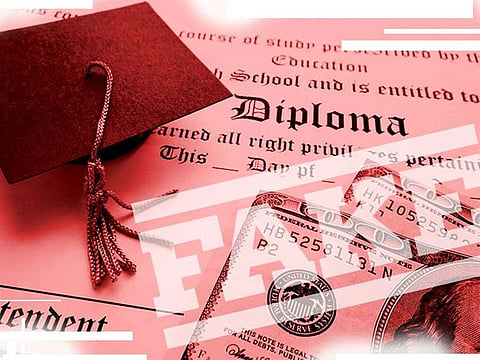Forged degree scandal rocks Kuwait
Beneficiaries include people holding high positions in banks

Manama: : A massive scandal concerning the selling of forged degrees has rocked Kuwait.
It all started around two weeks ago when an investigative report by Kuwaiti daily Al Qabas uncovered an operation which sold forged degrees from Arab and international high schools and universities.
The discovery shocked and angered the public and prompted calls to punish the violators regardless of their names and positions in the country. Around 250 people have allegedly bought fake degrees.
On Monday, Kuwait’s Prime Minister, Shaikh Jaber Al Mubarak, vowed to crack down on corruption.
A fake college degree
According to the daily, an “office” in the Salmiya area has been selling degrees for the last 13 years and the list of the beneficiaries included people holding high positions in banks and companies in the country.
The office claimed that it was a training institute and provided its “certificates” from foreign institutions in Lebanon, France and the US to Kuwaitis and expatriates without having to attend classes or study.
They sold college degrees for around KD9,200 and high school diplomas for around KD2,500.
The parliament is set to discuss the issue on April 16 and 17 in greater detail.
Lawmakers said the government should present a report that includes the extent of the forged certificate violations, the role of the Ministry of Education in dealing with them and the legal, judicial and academic procedures adopted by the ministry.
“We want to know whether the response by the cabinet to the reports of forged certificates has included all government agencies as well as the private sector,” a group of MPs said in a joint statement. We also want to know about the measures taken by the government to prevent such crimes and other related issues in the future.”
At a press conference on Monday, Education Minister Hamed Al Azemi insisted that the degrees mentioned by graduates from the American University of Athens and other universities in the Philippines, India and former Czechoslovakia have not been endorsed by the ministry.
-With inputs from Layelle Saad/Middle East Editor


